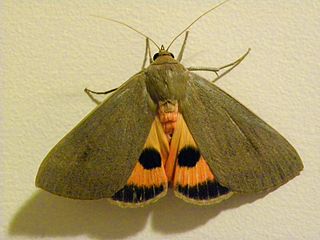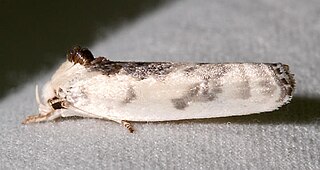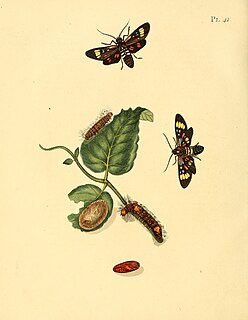Related Research Articles

The Pyralini are a tribe of snout moths described by Pierre André Latreille in 1809. They belong to the subfamily Pyralinae, which contains the "typical" snout moths of the Old World and some other regions. The genus list presented here is provisional.

Hypena is a genus of moths in the family Erebidae. It was first described by Franz von Paula Schrank in 1802. These non-migratory moths overwinter as pupae and almost never estivate as adults.

Omiodes is a moth genus in the family Crambidae. Several species are endemic to Hawaii.

Cisthene is a genus of lichen moths in the family Erebidae. The genus was erected by Francis Walker in 1854.

Cosmosoma is a genus of tiger moths in the subfamily Arctiinae. The genus was erected by Jacob Hübner in 1823.

Cyana is a genus of moths in the family Erebidae. Species are well distributed in Africa, Madagascar, China, India, Sri Lanka, Myanmar, Sumatra, Java and Borneo. The genus was erected by Francis Walker in 1854.
Histoea is a genus of moths in the subfamily Arctiinae. The genus was erected by Francis Walker in 1854.

Virbia is a genus of tiger moths in the family Erebidae. The genus was erected by Francis Walker in 1854.

Antaeotricha is a genus of moths. It is the largest genus in the subfamily Stenomatinae, numbering over 400 species in the Western Hemisphere.
Histioea amazonica is a moth of the subfamily Arctiinae. It was described by Arthur Gardiner Butler in 1876. It is found in the Amazon region.

Histioea cepheus is a moth of the subfamily Arctiinae. It was described by Pieter Cramer in 1779. It is found in Trinidad, Suriname and Venezuela.
Histioea excreta is a moth of the subfamily Arctiinae. It was described by Max Wilhelm Karl Draudt in 1915. It is found in Peru.
Histioea falerina is a moth of the subfamily Arctiinae. It was described by Herbert Druce in 1907. It is found in Peru.
Histioea glaucozona is a moth of the subfamily Arctiinae. It was described by Herbert Druce in 1898. It is found in the Amazon region.
Histioea imaon is a moth of the subfamily Arctiinae. It was described by George Hampson in 1898. It is found in the Amazon region.
Histioea meldolae is a moth of the subfamily Arctiinae. It was described by Arthur Gardiner Butler in 1876. It is found in Panama, Venezuela and Trinidad.
Histioea paulina is a moth of the subfamily Arctiinae. It was described by Francis Walker in 1866. It is found in São Paulo, Brazil.
Histioea peruana is a moth of the subfamily Arctiinae. It was described by Max Gaede in 1926. It is found in Peru.
Histioea proserpina is a moth of the subfamily Arctiinae. It was described by Jacob Hübner in 1827. It is found in the Amazon region.

Margaroniini is a tribe of the species-rich subfamily Spilomelinae in the pyraloid moth family Crambidae. The tribe was erected by Charles Swinhoe and Everard Charles Cotes in 1889.
References
- ↑ Savela, Markku. "Histioea tina (Walker, 1854)". Lepidoptera and Some Other Life Forms. Retrieved February 6, 2018.
- Pitkin, Brian & Jenkins, Paul. "Search results Family: Arctiidae". Butterflies and Moths of the World. Natural History Museum, London.